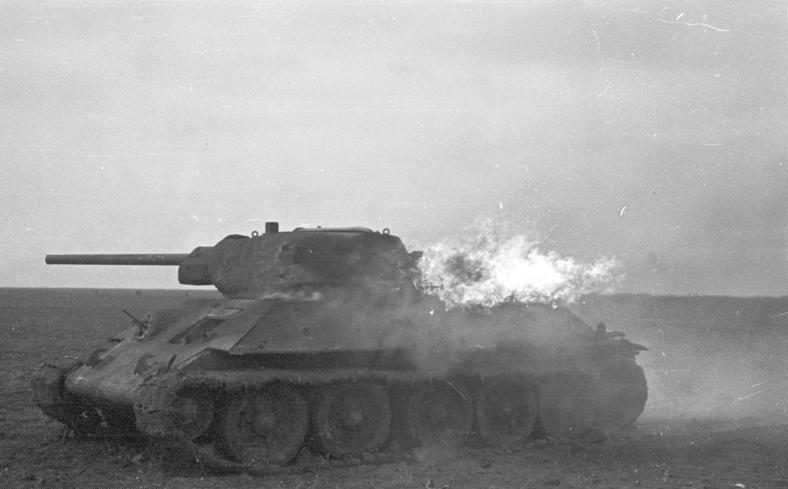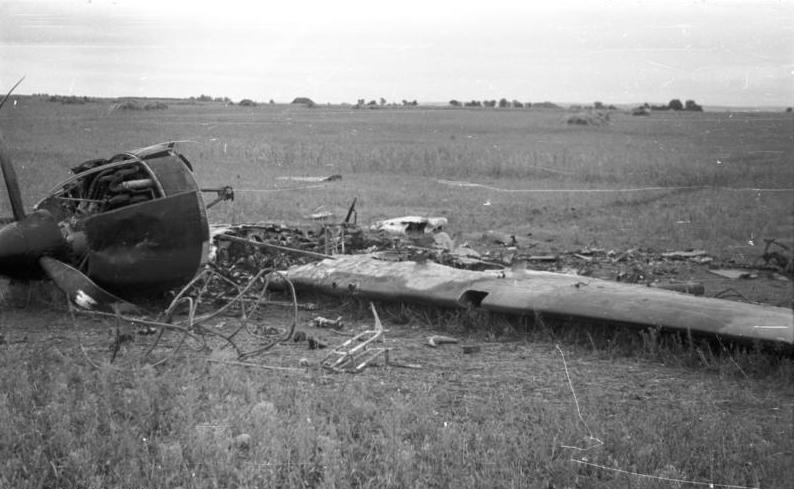.

Burning Soviet T-34 tank, Ukraine: photographer unknown, 1941 (Deutsches Bundesarchiv/German Federal Archive)
Meanwhile the sun was coming up from the horizon of green, and gradually the hoarse call of birds was becoming shriller and more lively. The sun seemed to beat down hammer-like on the cast-iron plate of the lagoons. A shiver ran along the water with a kind of metallic vibration and spread to the surface of the pools, just as the sound of a violin spreads like a shiver along the arms of a musician. By the roadside, and here and there in the cornfields, were overturned cars, burned trucks, disemboweled armored cars, abandoned guns, all twisted by explosions. But nowhere a man, nothing living, not even a corpse, not even any carrion. For miles and miles there was only dead iron. Dead bodies of machines, hundreds upon hundreds of miserable steel carcasses. The stench of putrifying rose from the fields and the lagoons. The cockpit of a plane was sticking up from the mud in the middle of a pool. The German cross was clearly discernible: it was a Messerschmitt. The smell of rotting iron won over the smell of men and horses -- that smell of old wars; even the smell of grain and the penetrating, sweet scent of sunflowers vanished amid that sour stench of scorched iron, rotting steel, dead machinery. The clouds of dust lifted by the wind from the far ends of the vast plain carried no smell of organic matter with them but a smell of iron filing. And all the time, while I was pushing into the heart of the plain and approached Nemirovskoye, the smell of iron and of petrol grew stronger in the dusty air; even the grass seemed to be permeated with that undefinable, strong and exhilarating smell of gasoline, as if the smell of men and beasts, the smell of trees, of grass and mud was overcome by that odor of gasoline and scorched iron.

Malaparte's descriptions of the iron are, of course, remarkable, piercing and recognizable to anyone who has experienced incendiary crisis (I'm thinking of house and building fires, the aftermath of some air disasters, 9/11 in downtown Manhattan). The passage would be extraordinary without the photos, but including them makes it more penetrating. One thing that came to mind, which seemed (slightly) relevant to me, at least, is that I don't naturally have olfactory reactions to black & white imagery, but I do "smell" color photography.
ReplyDeleteCurtis,
ReplyDeleteMalaparte's instigations to the reader's virtual sensorium are as remarkable as his unique use of repetition. The chapter from which this excerpt is drawn, Horse Kingdom, is staged on the Ukrainian plain, and counterposes the powerful rotting odour of organic putrefaction of a dead mare found on an abandoned farm, during the German advance, with the ambient, and overpowering, odour of burnt metal from the skeletons of destroyed military equipment scattered all about the landscape...